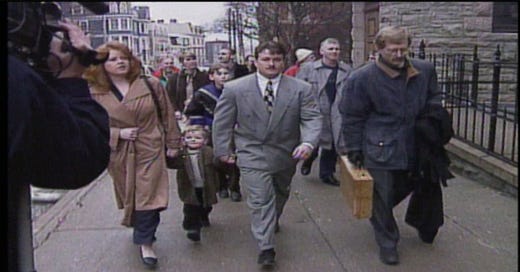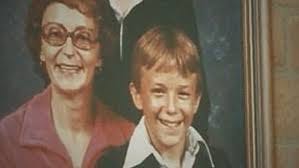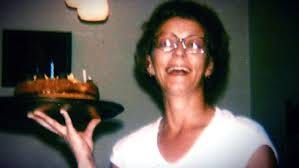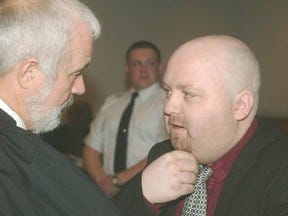The Tragic Case of Greg Parsons: A Son Falsely Accused of Murder
It was New Year’s Day, 1991, in the chilly town of St. John’s, Newfoundland. Snow blankets the streets, the holiday cheer is still lingering, and most people are enjoying the last days of their Christmas vacation. But inside the modest home of 70-year-old Catherine Carroll, a scene of unimaginable horror is about to unfold.
She doesn’t show up for Mass that morning—odd, considering her devout Catholic faith. A concerned friend decides to check on her. The door creaks open, and what they find inside is nothing short of a nightmare: Catherine Carroll is lying lifeless on the floor of her bedroom, surrounded by blood. She’s been stabbed repeatedly.
And just like that, the quiet little town becomes the setting for one of Canada’s most infamous wrongful convictions.
The Golden Boy of Newfoundland
Greg Parsons, Catherine’s 19-year-old son, wasn’t your typical rebellious teenager. He was the golden boy. Popular, charming, and talented, he had dreams of becoming a professional musician. To outsiders, Greg seemed like he had it all.
But like every family, the Parsons weren’t perfect. Greg and his mom had a tense relationship at the time of her murder. Catherine didn’t approve of Greg’s girlfriend, and their arguments had become increasingly heated. Small-town gossip turned those private squabbles into public scandal. To some, Greg was just a disrespectful kid who didn’t appreciate his mother.
And that was all it took for the police to turn their attention to him.
The Investigation: A Masterclass in Tunnel Vision
Within days of Catherine’s murder, the police zeroed in on Greg. Why? Because he fit their narrative. He was young, impulsive, and had a history of fighting with his mom. Case closed, right?
Their "evidence" was laughably thin. The most damning piece? A letter Greg had written to Catherine a few months before, venting his frustrations about their rocky relationship. The police twisted it into a motive, painting Greg as an angry, ungrateful son who finally snapped.
And then there was the bombshell testimony from Randy Druken, Greg’s childhood best friend. Randy claimed Greg had confessed to the murder during a casual conversation. No witnesses. No corroboration. Just Randy’s word.
Randy Druken
Randy Druken, a figure forever tied to Newfoundland’s history of wrongful convictions, passed away on December 27, 2024, at the age of 57. His life was marked by tragedy and controversy, including his own wrongful conviction for the 1993 murder of his girlfriend, Brenda Young. Druken spent nearly seven years behind bars, convicted largely on the false testimony of a jailhouse informant who claimed Druken had confessed. The informant later admitted fabricating the story.
DNA evidence eventually exonerated Druken, pointing instead to his brother, Paul Druken, as the likely perpetrator. Paul died in 1999, leaving many questions unanswered. Randy’s wrongful conviction, alongside those of Greg Parsons and Ronald Dalton, became a central focus of the Lamer Inquiry, a three-year investigation into systemic flaws in Newfoundland’s justice system.
The inquiry revealed a chilling pattern of tunnel vision and mishandled evidence that destroyed lives. In 2006, Randy Druken was awarded $2 million in compensation, but his life remained a testament to the devastating impact of injustice. His death adds another layer of complexity to the legacy of a system that failed not just him, but so many others.
Brian Doyle: The Real Killer
The man who truly committed the heinous crime was Brian Doyle, a dangerous individual with a long history of violence and deceit. Doyle had stabbed Catherine Carroll 53 times after a visit to her home, later admitting that her rejection of his advances had triggered his rage.
After murdering Catherine, Doyle allowed Greg Parsons to take the blame. Years later, during a “Mr. Big” sting operation in Ontario, Doyle confessed to undercover officers posing as members of an organized crime group. He even bragged about making someone else take the fall for his crime, a chilling reminder of his calculated manipulation.
Doyle was convicted of second-degree murder in 2002 and sentenced to life in prison with no chance of parole for 18 years.
Greg’s Trial: A Mockery of Justice
The trial was a circus. The prosecution paraded Randy’s testimony and Greg’s “angry” letter to his mother as their star evidence. There was no physical evidence tying Greg to the crime scene—none.
But the jury didn’t care. They saw a troubled relationship, a grieving son who didn’t cry enough in court, and a story that just felt right. In 1994, Greg was convicted of his own mother’s murder and sentenced to life in prison.
The Truth Comes Out
It would take seven long years for Greg to clear his name. In 1997, advancements in DNA testing brought new hope. When investigators re-analyzed the evidence from Catherine’s crime scene, they found something chilling:
The blood and hair found on Catherine’s body didn’t belong to Greg.
Keep reading with a 7-day free trial
Subscribe to The Newfoundland History Sleuth to keep reading this post and get 7 days of free access to the full post archives.








